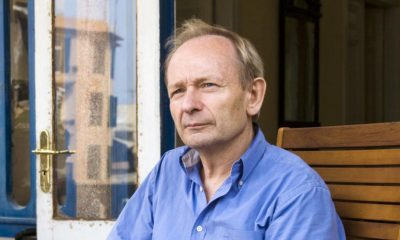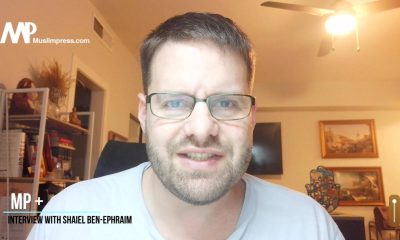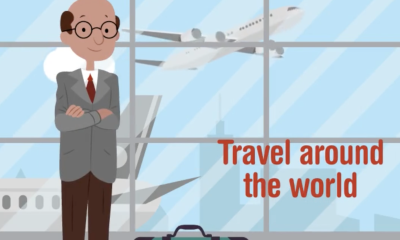Interview
Islamophobes have achieved fame and fortune from criticizing Islam and Muslims
muslimpress interview with CJ Werleman
CJ Werleman is an Australian journalist, author, political commentator, and analyst on conflict and terrorism. He is known for his work in exposing discrimination and injustices against Muslim communities globally and is the host of the program Foreign Object and The CJ Werleman Show
muslimpress: At that time, there was an expectation that non-violent Muslims should condemn radical Islamic terrorists. This was not only considered obscene by some, but it was also argued that it made efforts to counter terrorist narratives even harder. A Q&A program from around four years ago had asked, “whether it was fair for moderate Muslims to be asked to publicly condemn radical Islamist terrorists”? What was your answer to this question back then? Did you agree that the question had a bias that persuaded the viewer that there was terrorism in Islam when they divided the Muslims into moderates and radicals?
I believed then, as I do now, that the expectation for non-violent Muslims to condemn radical Islamic terrorists was not only obscene, but it also made efforts to counter terrorist narratives even harder. Asking Muslims to condemn the actions of ISIS, for instance, implied there was something fundamentally wrong with ‘their’ culture – and it was up to ‘them’ to fix it, rather than for all of us to address the socio-economic-political issues that were at the root of that phenomenon. When cultural entrepreneurs (Islamophobes) and right-wing politicians converged to paint Islam, and therefore Muslims, as responsible for the violent political acts of a tiny few, ISIS recruiters were in a position to propagate the idea that Muslims were not wanted in the West.
Muslim communities had been our most important counter-terrorism partner. Most foiled plots at that time had come as a result of Muslims reporting suspicious activities to law enforcement agencies. When we held non-violent Muslims collectively responsible for Islamic terrorism, we alienated those very communities. Thus, we were handing ISIS and other groups an important operational victory.
Imuslimpress: During that same period, Ayaan Hirsi Ali, an atheist, claimed in a show that “it is becoming increasingly difficult to criticise Islam and Muslims in western countries such as Australia.” What was your take on her claim at the time?
I viewed Hirsi Ali’s claim as a red herring. How could she say it was difficult to criticize Islam and Muslims in Western countries when she, alongside many of her contemporaries, had achieved fame and fortune from doing exactly that in Western countries?
The broader point was that cultural entrepreneurs, like her, didn’t confine their criticisms to Islam or extremist Muslims. They engaged in gross generalizations, promoted debunked anti-Muslim conspiracies (like Eurabia and Sharia law conspiracies), and advocated for anti-immigration policies – thus empowering both xenophobes and Islamic terrorist groups. For instance, Hirsi Ali had called for a ban on Muslim schools in the US, which not only ran counter to the US Constitution but also aided ISIS recruitment efforts by sending the message to three million peaceful Muslims living in the US that they were unwanted.
muslimpress: A philosophical question from that era: Is it more difficult to criticise divine religions or atheism?
My view was that whether you criticized religion or atheism, you tended to offend the same group of people: fundamentalists. And fundamentalists could be both hyper-religious or hyper-secular. When I had published a book that criticized the Bible, I offended mainly those who identified with the Christian Right. When I published a book criticizing strident atheism, I offended mainly those who identified with the post-9/11 atheist movement.
muslimpress: How did you analyze the dominance of atheism in Western media and among policy makers back then?
I wasn’t sure that premise was correct. At that time, of more than 500 US congressmen and senators, not one was an out-of-the-closet atheist, and the Republican Party was very much steered by the politics of the Christian Right. While Australian politics was mostly bereft of religious overtures, atheism was still largely an unmentioned identity.
muslimpress: Around that time, Australian police had charged five men with planning to join ISIS in Syria. What did you believe was the motive behind Western citizens joining ISIS at the height of its power? And how did you analyze Australia’s policies toward the crisis in Syria during that period?
For those who joined ISIS from Western countries during that time, personal grievances associated with socio-economic-political-secular aspects of Western society were seen to be the main drivers. Online ISIS recruiters were adept at not only exploiting these grievances, but they also exploited their target’s ignorance of Islam. This explained why the best-selling book for Western recruits traveling to Syria was reportedly Islam for Dummies. Beyond that, ISIS propaganda was very slick at the time – and it did a great job at romanticizing military adventurism, ultra-violence, and group belonging. For Muslims facing unemployment, underemployment, racism, alienation, and harassment from law enforcement, one could see how an ISIS propaganda video might have been highly seductive.

You may like


The Killings, Terror, and Armed Attacks in Iran Were Orchestrated by Israeli-Trained Teams

Two million Israelis need psychological support following Gaza war

SURA 57. Hadid, or Iron

SURA 50. Qaf

Iran, China, and Russia to Hold Naval Exercise

10 Tips for Employees

How to be Happ?

V Energy-saving tips and tricks

Let’s use it right

Iran, China, and Russia to Hold Naval Exercise

Two million Israelis need psychological support following Gaza war

Trump’s Worst Nightmare: How a Muslim Mayor Is Reshaping New York—and Challenging the Status Quo

Italian journalist participates in Arbaeen, Iraq

Qisas In Islam

Since the start of 2024; info motion







